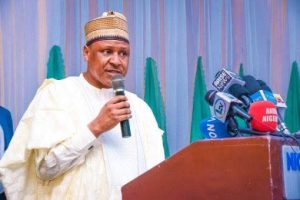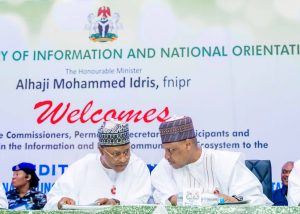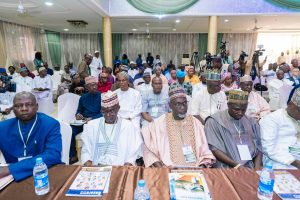
The Minister of Information and National Orientation, Alhaji Mohammed Idris, has urged state governments considering the dissolution or downgrading of their Ministries of Information to reconsider, emphasising their critical role in fostering public engagement, national orientation, and societal cohesion.
Idris made the appeal during the 48th National Council of Information and National Orientation in Kaduna on Friday, themed “Enhancing Public Information Management for Inclusive Governance: The Renewed Hope Agenda in Focus.”
He said, “At this juncture, I would want to make a passionate appeal to some of our state governments, especially on the status and operations of state Ministries of Information.
“And my plea, for emphasis, goes like this: that, in the ever-broadening parameters of governance, the role of Ministries of Information at both the national and state levels cannot be overstated.
“These ministries serve as the bridge between government policies and the citizens they are designed to benefit, thereby fostering transparency, accountability, and trust, which are essential pillars of any thriving democracy.”

Idris highlighted that Ministries of Information are indispensable for public sensitization, addressing misinformation, and ensuring the effective dissemination of government policies and programs.
He described the ministry as “the lifeblood of democracy and development,” especially in a diverse country like Nigeria.
Speaking on the Renewed Hope Agenda of President Bola Ahmed Tinubu, Idris noted that it is a call for transformational leadership anchored on inclusivity and transparency.
He said the essence of governance lies in its ability to connect, communicate, and inspire collective action.
The minister advised Information Managers to leverage technology, including artificial intelligence, to enhance the speed and accuracy of their messaging.
He also underscored the importance of public debate in refining policies, referencing ongoing discussions on President Tinubu’s proposed tax reforms.
“In every democracy, the strength of governance is deeply rooted in its ability to reflect the will and aspirations of the people. Public policies, while crafted with the best intentions, must continuously evolve to meet the dynamic needs and expectations of the citizens they serve,” Idris said.

He also stressed the need for equipping information officers with fact-checking skills and fostering collaborations with media organizations to counter misinformation.
He revealed that President Tinubu recently approved funds for the UNESCO Category-2 Media and Information Literacy (MIL) Institute, located at the National Open University of Nigeria in Abuja.
He stated, “In an era where fake news, propaganda, and biased reporting can significantly influence public opinion and decision-making, media literacy fosters critical thinking. It helps individuals analyze the intent behind media messages, understand the context in which they are presented, and assess their accuracy and relevance.”
He urged Commissioners for Information to utilize the institute once operational to enhance their staff’s capacity in combating fake news and disinformation.
The 48th National Council of Information and National Orientation was declared open by the Kaduna State Governor, Senator Uba Sani.
The event was attended by key stakeholders, including Senator Kenneth Eze, Chairman of the Senate Committee on Information and National Orientation, and Hon. Olusola Steve Fatoba, Chairman of the House Committee on Information, National Orientation, Ethics, and Values.
